22 mar 2019
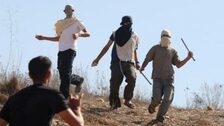
Jewish settlers went on a rampage in a Palestinian village in the north of the occupied West Bank, today, prompting local residents to come out to defend their village, according to a local official.
Ghassan Daghlas, an official with the anti-settlement commission, said that a group from the illegal settlement of Yitzhar, a known hardcore right-wing settlement, attacked Palestinian homes in the village of Urif, to the south of Nablus.
He said, according to WAFA, that the residents came out to ward off the settlers and protect their homes and children from the Jewish extremists.
Often, Israeli soldiers who are deployed in the area do not interfere to stop the settlers, but only intervene to attack the Palestinian villagers who come out to defend and protect their homes.
Ghassan Daghlas, an official with the anti-settlement commission, said that a group from the illegal settlement of Yitzhar, a known hardcore right-wing settlement, attacked Palestinian homes in the village of Urif, to the south of Nablus.
He said, according to WAFA, that the residents came out to ward off the settlers and protect their homes and children from the Jewish extremists.
Often, Israeli soldiers who are deployed in the area do not interfere to stop the settlers, but only intervene to attack the Palestinian villagers who come out to defend and protect their homes.
21 mar 2019
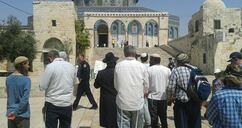
Over 60 Jewish settlers on Thursday morning desecrated the Aqsa Mosque’s courtyards under tight police protection.
Local sources affirmed that 63 settlers escorted by police forces entered the Mosque through al-Maghariba Gate and toured the Mosque’s courtyards and plateaus while receiving information about the alleged temple mount from rabbis.
They added that the Israeli police provocatively allowed some settlers to perform rituals near the Mosque’s Bab al-Rahma prayer area.
The Aqsa Mosque is exposed to daily desecration by Jewish settlers in the morning and the afternoon except on Fridays and Saturdays.
The Israeli police close al-Maghariba Gate, which is used by Jews to enter the Mosque, at 10:30 am after the settlers complete their morning tours at the holy site. Later in the afternoon, the same gate is reopened for evening tours by settlers.
During the presence of settlers inside the Mosque compound, entry restrictions are imposed on Muslim worshipers at the entrances leading to the Mosque and their IDs are seized until they leave the holy place.
Local sources affirmed that 63 settlers escorted by police forces entered the Mosque through al-Maghariba Gate and toured the Mosque’s courtyards and plateaus while receiving information about the alleged temple mount from rabbis.
They added that the Israeli police provocatively allowed some settlers to perform rituals near the Mosque’s Bab al-Rahma prayer area.
The Aqsa Mosque is exposed to daily desecration by Jewish settlers in the morning and the afternoon except on Fridays and Saturdays.
The Israeli police close al-Maghariba Gate, which is used by Jews to enter the Mosque, at 10:30 am after the settlers complete their morning tours at the holy site. Later in the afternoon, the same gate is reopened for evening tours by settlers.
During the presence of settlers inside the Mosque compound, entry restrictions are imposed on Muslim worshipers at the entrances leading to the Mosque and their IDs are seized until they leave the holy place.
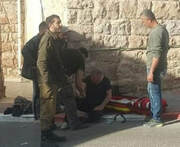
An illegal Israeli colonialist settler rammed, Thursday, a Palestinian man with his car, and fled the scene, before Palestinian medics rushed the wounded man to a hospital, in Hebron city, in the southern part of the occupied West Bank.
Aref Jaber, a nonviolent activist with the Human Rights Coalition in Hebron, said the colonist rammed a Palestinian, identified as Jom’a Qfeisha, before fleeing the scene.
Jaber added that the wounded man works for the Hebron Reconstruction Committee, and suffered a fracture in his arm, in addition to various cuts and bruises.
Medical sources said Qfeisha was rushed by local medics to a hospital in Hebron city, and described his wounded as moderate.
Israeli soldiers, who are constantly deployed in Hebron, examined the man, but did not call for an ambulance, before the Palestinian medics managed to reach him.
Aref Jaber, a nonviolent activist with the Human Rights Coalition in Hebron, said the colonist rammed a Palestinian, identified as Jom’a Qfeisha, before fleeing the scene.
Jaber added that the wounded man works for the Hebron Reconstruction Committee, and suffered a fracture in his arm, in addition to various cuts and bruises.
Medical sources said Qfeisha was rushed by local medics to a hospital in Hebron city, and described his wounded as moderate.
Israeli soldiers, who are constantly deployed in Hebron, examined the man, but did not call for an ambulance, before the Palestinian medics managed to reach him.
Then the army came and beat me up and held me from here (chin). He took my ID and my phone and detained me, here. Don’t know what to do. Every few days I get arrested. I have a suspended sentence for 10 months, against me, and, if he calls the court, now, I will probably have to pay 10.000 shekels.
Where will I get them this money, then?! I work the whole day for 50 shekels. Not long ago, I was arrested for two months, because I was beaten up by a settler, and there's a video of that incident where they were attacking me.”
Visit the International Solidarity Movement (ISM).
Where will I get them this money, then?! I work the whole day for 50 shekels. Not long ago, I was arrested for two months, because I was beaten up by a settler, and there's a video of that incident where they were attacking me.”
Visit the International Solidarity Movement (ISM).

A group of settlers carried out, on Wednesday at dawn, a series of attacks against Palestinian properties in Battir village, to the west of Bethlehem.
The mayor of Battir, Tayseer Qatoush, said that the people of the village were shocked by racist slogans painted on the walls of one of the mosques and some vehicles. The graffiti was signed by “price tag” groups.
He added that the tires of some of the vehicles were punctured and that racist slogans, against Arab and Palestinians, were painted on it, threatening to carry out more attacks against Palestinians .
Price tag gangs are a religious right-wing movement that officially appeared in July of 2008, Al Ray further notes. The group has carried out many attacks against Palestinians, such as setting fires to their homes, painting racist slogans on their property, and attacking mosques.
The mayor of Battir, Tayseer Qatoush, said that the people of the village were shocked by racist slogans painted on the walls of one of the mosques and some vehicles. The graffiti was signed by “price tag” groups.
He added that the tires of some of the vehicles were punctured and that racist slogans, against Arab and Palestinians, were painted on it, threatening to carry out more attacks against Palestinians .
Price tag gangs are a religious right-wing movement that officially appeared in July of 2008, Al Ray further notes. The group has carried out many attacks against Palestinians, such as setting fires to their homes, painting racist slogans on their property, and attacking mosques.
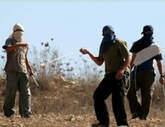
A group of extremist illegal Israeli colonialist setters attacked, on Wednesday at night, a Palestinian home at the entrance of Burqa village, northwest of Nablus, in northern West Bank.
The colonists attacked the home, owned by Mahmoud Hajja, causing damage to the property and to his car, parked in front of the building.
In addition, groups of fanatic colonists gathered on the main Nablus-Jenin road, and hurled stones at Palestinian cars, causing damage.
The Palestinians, despite being unarmed, chased the armed colonists, who started firing live rounds in the area, and fled to the located of the former Homesh colony.
The colonists attacked the home, owned by Mahmoud Hajja, causing damage to the property and to his car, parked in front of the building.
In addition, groups of fanatic colonists gathered on the main Nablus-Jenin road, and hurled stones at Palestinian cars, causing damage.
The Palestinians, despite being unarmed, chased the armed colonists, who started firing live rounds in the area, and fled to the located of the former Homesh colony.
20 mar 2019
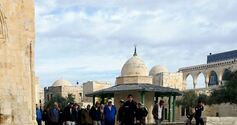
Hordes of Israeli settlers on Tuesday defiled al-Aqsa Mosque in Occupied Jerusalem under police guard.
Local sources said that 67 Jewish settlers forced their way into al-Aqsa Mosque via al-Maghareba Gate in the early morning hours while escorted by a large police force.
The extremist settlers toured the site and performed Talmudic rituals near Bab al-Rahma prayer area.
Meanwhile, the Israeli police arrested the Aqsa guard Mohammed al-Salhi inside the Mosque and transferred him to a nearby interrogation center.
The number of settlers in the site is expected to increase after noon prayer, the local sources said.
Israeli settlers carry out provocative break-ins into al-Aqsa Mosque on a daily basis, except on Fridays and Saturdays, in two rounds: in the morning and afternoon.
Local sources said that 67 Jewish settlers forced their way into al-Aqsa Mosque via al-Maghareba Gate in the early morning hours while escorted by a large police force.
The extremist settlers toured the site and performed Talmudic rituals near Bab al-Rahma prayer area.
Meanwhile, the Israeli police arrested the Aqsa guard Mohammed al-Salhi inside the Mosque and transferred him to a nearby interrogation center.
The number of settlers in the site is expected to increase after noon prayer, the local sources said.
Israeli settlers carry out provocative break-ins into al-Aqsa Mosque on a daily basis, except on Fridays and Saturdays, in two rounds: in the morning and afternoon.

The Israeli occupation forces at midnight killed two Palestinian youths during a raid on the West Bank city of Nablus.
Local sources said that the Israeli forces executed two Palestinian youths inside a car near Joseph's Tomb area for no apparent reason.
The Israeli forces further opened fire at the ambulances that rushed to the scene to evacuate the youths, leaving them to bleed to death, they added.
The Palestinian Ministry of Health announced that the martyrs are Raed Hamdan, 21, and Zeid Nouri, 20.
Before the shooting, the Israeli occupation forces stormed Joseph's Tomb area in large numbers, climbed the rooftops of the surrounding Palestinian homes, and deployed in the streets to clear way for a settler break in into the site.
Anti-settlement activist Ghassan Daghlas said that hundreds of Jewish settlers at daybreak stormed Joseph's Tomb while escorted by heavily armed Israeli forces.
Violent clashes erupted in the area during which a Palestinian citizen was injured by Israeli gunfire and transferred to a local hospital for treatment.
The murder of Hamdan and Nouri came only a few hours after the Israeli army assassinated Omar Abu Laila, the Palestinian accused of killing two Israelis in Ariel attack, in Ramallah.
Local sources said that the Israeli forces executed two Palestinian youths inside a car near Joseph's Tomb area for no apparent reason.
The Israeli forces further opened fire at the ambulances that rushed to the scene to evacuate the youths, leaving them to bleed to death, they added.
The Palestinian Ministry of Health announced that the martyrs are Raed Hamdan, 21, and Zeid Nouri, 20.
Before the shooting, the Israeli occupation forces stormed Joseph's Tomb area in large numbers, climbed the rooftops of the surrounding Palestinian homes, and deployed in the streets to clear way for a settler break in into the site.
Anti-settlement activist Ghassan Daghlas said that hundreds of Jewish settlers at daybreak stormed Joseph's Tomb while escorted by heavily armed Israeli forces.
Violent clashes erupted in the area during which a Palestinian citizen was injured by Israeli gunfire and transferred to a local hospital for treatment.
The murder of Hamdan and Nouri came only a few hours after the Israeli army assassinated Omar Abu Laila, the Palestinian accused of killing two Israelis in Ariel attack, in Ramallah.
19 mar 2019
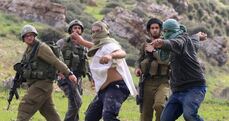
Hordes of Jewish settlers on Monday evening attacked Palestinian citizens and cars in southern Jenin, northern Nablus and northern Salfit in the occupied West Bank.
Local sources told a reporter for the Palestinian Information Center (PIC) that groups of settlers stormed areas near Silat ad-Dhahr in southern Jenin and Burqa in northern Nablus and embarked on attacking Palestinian citizens.
They said that settlers stormed the evacuated site of Homesh settlement and olive groves in southern Jenin, hurled stones at passing cars and tried to physically assault local residents.
Two university students suffered injuries and transferred to Rafidia Hospital in Nablus after settlers showered their car with stones in the area.
In northern Salfit, another group of settlers attacked Palestinian cars on a road near Kifl Hares town.
Eyewitnesses said that dozens of settlers rallied at the junction of Kifl Hares town and threw stones at passing cars, causing damage to many of them.
Local sources told a reporter for the Palestinian Information Center (PIC) that groups of settlers stormed areas near Silat ad-Dhahr in southern Jenin and Burqa in northern Nablus and embarked on attacking Palestinian citizens.
They said that settlers stormed the evacuated site of Homesh settlement and olive groves in southern Jenin, hurled stones at passing cars and tried to physically assault local residents.
Two university students suffered injuries and transferred to Rafidia Hospital in Nablus after settlers showered their car with stones in the area.
In northern Salfit, another group of settlers attacked Palestinian cars on a road near Kifl Hares town.
Eyewitnesses said that dozens of settlers rallied at the junction of Kifl Hares town and threw stones at passing cars, causing damage to many of them.
18 mar 2019
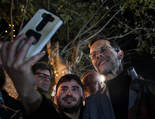
Moshe Feiglin on the campaign trail in Sderot
Ultranationalist Moshe Feiglin formed Zehut after his extremist views saw him kicked out of Likud; but is his stance on marijuana distracting from policies that would be less palatable to young secular voters?
A fringe party led by an ultranationalist libertarian with a criminal record who vows to legalize marijuana seems to diverge dramatically from the long list of candidates of the past who have drawn attention to their improbable runs for the Knesset.
For starters, Moshe Feiglin's Zehut party has a real shot of getting elected and could even emerge as a kingmaker in a tightly contested race for prime minister. But his seemingly liberal civic platform, which has generated a strong hipster following, could be masking a far more polarizing agenda.
Feiglin, who got pushed out of Benjamin Netanyahu's ruling Likud party four years ago for his extreme right-wing positions, has taken the campaign by storm, putting cannabis high on the national agenda and forcing the front-runners to take a stand on the issue. He's also one of the few party leaders to refrain from endorsing either the prime minister or his top challenger, retired IDF chief Benny Gantz.
"We are in nobody's pocket," Feiglin told Army Radio recently. "Legalization is the condition for us joining any government."
The message seems to be catching on, ironically, in the first election in 20 years that the single-issue Green Leaf party has refrained from running. In response to what has been dubbed the "Feiglin effect," Netanyahu this week boasted about increasing the availability of medical cannabis and approving its export, making Israel just the third nation in the world to do so. He also promised to "examine" the issue of legalization for recreational use.
Labor Party leader Avi Gabbay said he was in favor of legalization, calling cannabis less dangerous than alcohol. In a radio interview, he then disclosed he had smoked it himself in the past. And the dovish Meretz party, seeking to reclaim what would seem to be its natural electorate, issued a reminder that it was the first party in parliament to promote the issue while others were now merely catching up.
But Feiglin, an observant Jew and West Bank settler who doesn't smoke marijuana himself, has been the one cashing in, finding an unlikely audience among urban youngsters drawn to his message of personal freedom and domestic policies, which, besides legalization, include an anti-labor union platform that promotes school vouchers, animal rights and free market economics. Feiglin's wife, Tzippy, has used cannabis to alleviate the symptoms of Parkinson's disease, from which she suffers.
With his skullcap, trim beard and small round-frame glasses, the 56-year-old Feiglin hardly cuts the image of an iconoclast. But he's become an internet sensation with viral animated online hipster memes portraying him as a cool gangster with sunglasses and a joint hanging from his lips.
It's a stunning makeover for a man who first made his name in Israel for orchestrating raucous protests against the Oslo Peace accords in the early 1990s. A recent cartoon in the Maariv daily poked fun at the irony of his drawing liberal supporters. Cast as the pied piper, Feiglin is shown leading a slew of smiling, glassy-eyed voters following the trail of smoke from a joint he is holding in the air, while Ynet cartoonist Guy Morad depicted him as dressing as a "stoner" in the upcoming Purim holiday.
"Feiglin is a revelation to young, secular supporters of the center-left," explained Ynet commentator Yaron Dekel. "He emphasizes that he is primarily liberal when it comes to the issue of religion and state, and a staunch supporter of the legalization of marijuana, but is hiding an extremely hawkish platform in every other arena."
The political manifesto of Feiglin's Zehut -- Hebrew for identity -- party includes canceling signed agreements with the Palestinians, making Israeli Arab citizens pass a loyalty test and offering financial incentives to them to emigrate elsewhere if they refuse to accept Jewish sovereignty over the land.
He's also spoken out against women, gays and Reform Jews. In 1995, shortly before Yitzhak Rabin was assassinated, his Zo Artzeinu (This is our Land) movement blocked dozens of major intersections that wreaked havoc throughout the country. The Supreme Court later sentenced him to six months in prison for sedition against the state, which was later commuted to community service.
Feiglin, who refused an Associated Press interview, has downplayed his past as an ultranationalist activist and insists he is currently focused on civic issues alone. In reinventing himself, he has managed to create the latest iteration of a regular Israeli election ritual of obscure and offbeat lists offering an entertaining diversion to those voters despairing over Israel's weighty issues.
Previous parties have included a faction calling for the establishment of a national casino and a group led by a fishmonger and puppeteer that tried to abolish bank fees. An offshoot of Green Leaf aligned with elderly Holocaust survivors to make a run in 2009 and four years later its castaways ran as the Israeli Pirate Party, offering a platform promoting a variety of personal freedoms, including the right to sail the high seas.
Should Zehut manage to cross the electoral threshold, it would join the likes of the Israeli Pensioners Party that managed to win seven seats in the 2006 election and joined former prime minister Ehud Olmert's cabinet. Seen largely as the recipient of protest votes against the system, the group of retirees led by an octogenarian former spymaster disappeared in the next election.
Feiglin's Zehut party, however, could prove to have a greater impact if it eventually has a say in who forms the next government. Columnist Shmuel Rosner called its emergence a "deliberate, cunning distraction" that reflects the dire state of discourse and overall disgust with mainstream politics.
"It is the proof -- and not the first -- of the difficulty the public has in addressing complex issues that require expertise and in-depth study," he wrote Thursday in Maariv. "Everyone has despaired and only wants to be given something to dull their senses. It could be that the marijuana in the campaign is simply medical cannabis to relieve pain."
Ultranationalist Moshe Feiglin formed Zehut after his extremist views saw him kicked out of Likud; but is his stance on marijuana distracting from policies that would be less palatable to young secular voters?
A fringe party led by an ultranationalist libertarian with a criminal record who vows to legalize marijuana seems to diverge dramatically from the long list of candidates of the past who have drawn attention to their improbable runs for the Knesset.
For starters, Moshe Feiglin's Zehut party has a real shot of getting elected and could even emerge as a kingmaker in a tightly contested race for prime minister. But his seemingly liberal civic platform, which has generated a strong hipster following, could be masking a far more polarizing agenda.
Feiglin, who got pushed out of Benjamin Netanyahu's ruling Likud party four years ago for his extreme right-wing positions, has taken the campaign by storm, putting cannabis high on the national agenda and forcing the front-runners to take a stand on the issue. He's also one of the few party leaders to refrain from endorsing either the prime minister or his top challenger, retired IDF chief Benny Gantz.
"We are in nobody's pocket," Feiglin told Army Radio recently. "Legalization is the condition for us joining any government."
The message seems to be catching on, ironically, in the first election in 20 years that the single-issue Green Leaf party has refrained from running. In response to what has been dubbed the "Feiglin effect," Netanyahu this week boasted about increasing the availability of medical cannabis and approving its export, making Israel just the third nation in the world to do so. He also promised to "examine" the issue of legalization for recreational use.
Labor Party leader Avi Gabbay said he was in favor of legalization, calling cannabis less dangerous than alcohol. In a radio interview, he then disclosed he had smoked it himself in the past. And the dovish Meretz party, seeking to reclaim what would seem to be its natural electorate, issued a reminder that it was the first party in parliament to promote the issue while others were now merely catching up.
But Feiglin, an observant Jew and West Bank settler who doesn't smoke marijuana himself, has been the one cashing in, finding an unlikely audience among urban youngsters drawn to his message of personal freedom and domestic policies, which, besides legalization, include an anti-labor union platform that promotes school vouchers, animal rights and free market economics. Feiglin's wife, Tzippy, has used cannabis to alleviate the symptoms of Parkinson's disease, from which she suffers.
With his skullcap, trim beard and small round-frame glasses, the 56-year-old Feiglin hardly cuts the image of an iconoclast. But he's become an internet sensation with viral animated online hipster memes portraying him as a cool gangster with sunglasses and a joint hanging from his lips.
It's a stunning makeover for a man who first made his name in Israel for orchestrating raucous protests against the Oslo Peace accords in the early 1990s. A recent cartoon in the Maariv daily poked fun at the irony of his drawing liberal supporters. Cast as the pied piper, Feiglin is shown leading a slew of smiling, glassy-eyed voters following the trail of smoke from a joint he is holding in the air, while Ynet cartoonist Guy Morad depicted him as dressing as a "stoner" in the upcoming Purim holiday.
"Feiglin is a revelation to young, secular supporters of the center-left," explained Ynet commentator Yaron Dekel. "He emphasizes that he is primarily liberal when it comes to the issue of religion and state, and a staunch supporter of the legalization of marijuana, but is hiding an extremely hawkish platform in every other arena."
The political manifesto of Feiglin's Zehut -- Hebrew for identity -- party includes canceling signed agreements with the Palestinians, making Israeli Arab citizens pass a loyalty test and offering financial incentives to them to emigrate elsewhere if they refuse to accept Jewish sovereignty over the land.
He's also spoken out against women, gays and Reform Jews. In 1995, shortly before Yitzhak Rabin was assassinated, his Zo Artzeinu (This is our Land) movement blocked dozens of major intersections that wreaked havoc throughout the country. The Supreme Court later sentenced him to six months in prison for sedition against the state, which was later commuted to community service.
Feiglin, who refused an Associated Press interview, has downplayed his past as an ultranationalist activist and insists he is currently focused on civic issues alone. In reinventing himself, he has managed to create the latest iteration of a regular Israeli election ritual of obscure and offbeat lists offering an entertaining diversion to those voters despairing over Israel's weighty issues.
Previous parties have included a faction calling for the establishment of a national casino and a group led by a fishmonger and puppeteer that tried to abolish bank fees. An offshoot of Green Leaf aligned with elderly Holocaust survivors to make a run in 2009 and four years later its castaways ran as the Israeli Pirate Party, offering a platform promoting a variety of personal freedoms, including the right to sail the high seas.
Should Zehut manage to cross the electoral threshold, it would join the likes of the Israeli Pensioners Party that managed to win seven seats in the 2006 election and joined former prime minister Ehud Olmert's cabinet. Seen largely as the recipient of protest votes against the system, the group of retirees led by an octogenarian former spymaster disappeared in the next election.
Feiglin's Zehut party, however, could prove to have a greater impact if it eventually has a say in who forms the next government. Columnist Shmuel Rosner called its emergence a "deliberate, cunning distraction" that reflects the dire state of discourse and overall disgust with mainstream politics.
"It is the proof -- and not the first -- of the difficulty the public has in addressing complex issues that require expertise and in-depth study," he wrote Thursday in Maariv. "Everyone has despaired and only wants to be given something to dull their senses. It could be that the marijuana in the campaign is simply medical cannabis to relieve pain."
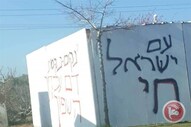
Israeli settlers set up a large steel structure at the roundabout of the Haris village in the northern occupied West Bank city of Salfit, on Monday morning.
Locals reported that large numbers of Israeli settlers camped inside the steel structure, under armed security by Israeli forces.
Locals expressed fear that setting up the structure could be a start for a series of assaults against them and their properties in the village.
Israeli forces had sealed off all the entrances of Haris, Kifl Haris and Deir Istiya villages in search of a Palestinian suspected of carrying out a shooting attack, near the illegal Israeli settlement of Ariel, leaving two Israelis killed and others injured.
Locals reported that large numbers of Israeli settlers camped inside the steel structure, under armed security by Israeli forces.
Locals expressed fear that setting up the structure could be a start for a series of assaults against them and their properties in the village.
Israeli forces had sealed off all the entrances of Haris, Kifl Haris and Deir Istiya villages in search of a Palestinian suspected of carrying out a shooting attack, near the illegal Israeli settlement of Ariel, leaving two Israelis killed and others injured.
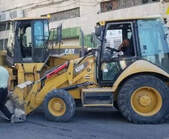
Israeli soldiers invaded, Monday, Khirbat Um Neer village, east of Yatta town, in the southern West Bank governorate of Hebron, and demolished a water well.
Rateb Jabour, the coordinator of the Popular Committee against the Annexation Wall and Colonies in southern Hebron, said the soldiers demolished the well, allegedly for being dug without a permit.
He added that the Palestinian who owned the well, identified as Farid Ahmad Jabour, used it to collect rain water for his home and farmland, amidst frequent water shortages in the area.
Jabour also said that the well is near the illegal Israeli Susya colony, which was built on private Palestinian lands, and stated that the army and the colonists carry out frequent violations against the villagers, their homes and lands, to force them to leave.
In related news, illegal Israeli colonists installed several mobile homes on Palestinian lands, in the southeastern area of Kufur Qaddoum town, east of Qalqilia, in northern West Bank.
The colonists installed the homes near Kedumim illegal colony, while dozens of soldiers were deployed in the area, and on roads between Qalqilia and Nablus.
Settlers Erect Mobile Homes East of Qalqilia
Israeli settlers have set up several mobile homes in the southeastern part of the northern West Bank town of Kafr Qaddoum, to the east of Qalailia.
Sources from the Anti-Wall and Settlement Committee’s Office, in the northern West Bank, confirmed that extremist Israeli settlers, under heavy military protection, set up several mobile homes or caravans near the Kedumim settlement, WAFA reports.
This came as settlers stepped up their attacks against Palestinians in the northern West Bank, in retaliation for the killing of a number of Israeli soldiers and injuring another in a stabbing and shooting attack outside the settlement of Ariel, on Sunday.
On Sunday evening, settlers hurled rocks at Palestinian vehicles travelling along Nablus-Qalqilia and Nablus-Tulkarem Roads, causing damages.
They also attacked a Palestinian house with stones in Huwwara town, to the south of Nablus, shattering its windows. No injuries were reported to have occurred, in any of the attacks.
Israel imposes harsh penalties on Palestinian stone throwers, as it passed a legislation, in 2015, allowing for up to 20 years prison sentence if charged with throwing stones at Israeli vehicles, and a minimum of three years for the act of throwing a stone at any Israeli. In contrast, Israeli settlers are rarely prosecuted under the same standards of the law.
Between 500,000 and 600,000 Israelis live in Jewish-only settlements across occupied East Jerusalem and the West Bank in violation of international law.
Rateb Jabour, the coordinator of the Popular Committee against the Annexation Wall and Colonies in southern Hebron, said the soldiers demolished the well, allegedly for being dug without a permit.
He added that the Palestinian who owned the well, identified as Farid Ahmad Jabour, used it to collect rain water for his home and farmland, amidst frequent water shortages in the area.
Jabour also said that the well is near the illegal Israeli Susya colony, which was built on private Palestinian lands, and stated that the army and the colonists carry out frequent violations against the villagers, their homes and lands, to force them to leave.
In related news, illegal Israeli colonists installed several mobile homes on Palestinian lands, in the southeastern area of Kufur Qaddoum town, east of Qalqilia, in northern West Bank.
The colonists installed the homes near Kedumim illegal colony, while dozens of soldiers were deployed in the area, and on roads between Qalqilia and Nablus.
Settlers Erect Mobile Homes East of Qalqilia
Israeli settlers have set up several mobile homes in the southeastern part of the northern West Bank town of Kafr Qaddoum, to the east of Qalailia.
Sources from the Anti-Wall and Settlement Committee’s Office, in the northern West Bank, confirmed that extremist Israeli settlers, under heavy military protection, set up several mobile homes or caravans near the Kedumim settlement, WAFA reports.
This came as settlers stepped up their attacks against Palestinians in the northern West Bank, in retaliation for the killing of a number of Israeli soldiers and injuring another in a stabbing and shooting attack outside the settlement of Ariel, on Sunday.
On Sunday evening, settlers hurled rocks at Palestinian vehicles travelling along Nablus-Qalqilia and Nablus-Tulkarem Roads, causing damages.
They also attacked a Palestinian house with stones in Huwwara town, to the south of Nablus, shattering its windows. No injuries were reported to have occurred, in any of the attacks.
Israel imposes harsh penalties on Palestinian stone throwers, as it passed a legislation, in 2015, allowing for up to 20 years prison sentence if charged with throwing stones at Israeli vehicles, and a minimum of three years for the act of throwing a stone at any Israeli. In contrast, Israeli settlers are rarely prosecuted under the same standards of the law.
Between 500,000 and 600,000 Israelis live in Jewish-only settlements across occupied East Jerusalem and the West Bank in violation of international law.
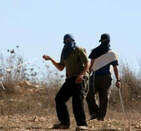
Groups of fanatic illegal Israeli colonialist settlers attacked, on Sunday at night, many Palestinian homes in at least two areas in Hebron, in the southern part of the occupied West Bank.
Rateb Jabour, the coordinator of the National and Popular Committee in southern West Bank, said dozens of colonists of the illegal Ma’on outpost, which was installed on private Palestinian lands, east of Yatta town, south of Hebron, hurled stones at many homes, and shouted insults at the families.
He added that dozens of colonists also gathered near Keryat Arba’ illegal colony, east of Hebron, and hurled stones at many cars, driving on Road #60, in addition to obstructing Palestinian traffic while trying to assault the residents.
Rateb Jabour, the coordinator of the National and Popular Committee in southern West Bank, said dozens of colonists of the illegal Ma’on outpost, which was installed on private Palestinian lands, east of Yatta town, south of Hebron, hurled stones at many homes, and shouted insults at the families.
He added that dozens of colonists also gathered near Keryat Arba’ illegal colony, east of Hebron, and hurled stones at many cars, driving on Road #60, in addition to obstructing Palestinian traffic while trying to assault the residents.
